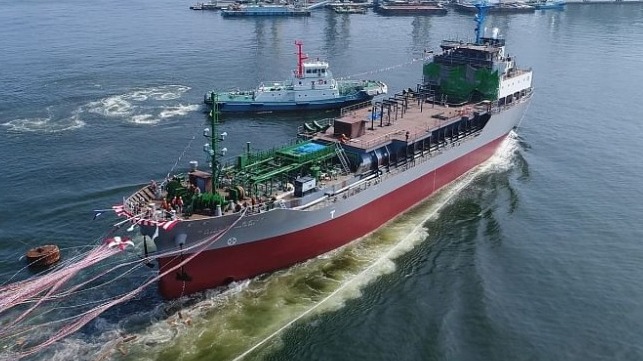Korean Design for Ammonia Bunker Vessel Awarded AiP

The Korean shipping industry is taking a major step in the develop to the infrastructure to support ammonia’s adoption as a marine fuel. The Korean Register announced that it has granted an Approval in Principle (AIP) for an ammonia bunkering vessel, the first of its kind in Korea, and one of the first designs for the emerging alternative fuel. Earlier this month a Japanese partnership also announced that it was working to develop the infrastructure for ammonia.
Ammonia because of its zero-carbon properties is attracting worldwide attention as a potential eco-friendly fuel for next-generation ships. Extensive research is ongoing to develop marine engines and the systems required to support the transition to ammonia-fueled ships. The Korean government is working to support the transition to zero-carbon fueled ships through a range of R&D projects undertaken with industry stakeholders.
A Korean design engineering company, KMS EMEC, working in partnership with Singapore shipping company Navig8 developed the design concept for the bunker vessel in consultation with the Korean Register. Working with Navig8, KMS EMEC created the first domestic conceptual design, in accordance with the MAN Energy Solution’s engine specifications. Navig8 also conducted a detailed review of the commercial feasibility and operational economics of ammonia as a ship fuel, from the viewpoint of a shipping company.
The vessel design, which is the first 8K ammonia bunkering ship in Korea, is for a dual fuel design, using both marine diesel (MGO) and ammonia. KR then completed the necessary risk assessments, design safety verification and reviewed compliance with Korean and international regulations.
“The whole maritime industry is interested in eco-friendly alternative fuels to meet the requirements of the new environmental regulations,” said KIM Dae-Heon, Executive Vice President of KR’s R&D Division. “As a result, this JDP confirming the feasibility of 8K ammonia bunkering ships is significant. KR will continue working to work with industry stakeholders to find the most effective ways to meet the environmental regulations and to respond quickly and effectively to any environmental challenge as it arises.”

that matters most
Get the latest maritime news delivered to your inbox daily.
At the beginning of March, a new Japanese partnership, including the Japanese trading firm Itochu and its energy trading business Itochu Enex, chemicals firm Ube Industries, and shipping firm Uyeno Transtech, agreed to work on developing domestic ammonia bunkering infrastructure, Itochu said it was working to develop the infrastructure in Japan and Singapore to support the operation of ammonia-fueled vessels including the necessary bunkering operations. Sumitomo, the Japanese banking giant, is also joining in a feasibility study for ammonia bunkering while Uyeno Transtech, which is a partner in Ecobunker in Tokyo, is using its experiencing in LNG fueling to begin to develop the design for ammonia bunkering operations.
